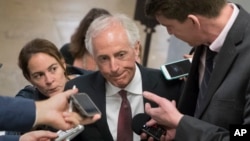A Senate panel has overwhelmingly approved new U.S. sanctions targeting Iran's support for international terrorism and its ballistic missile program, the first move to punish Tehran since a landmark nuclear accord went into effect.
Thursday's 18-3 vote by the Senate Foreign Relations Committee came days after President Donald Trump pledged common cause with Israel and Sunni Arab states to counter Iranian influence in the region.
"The bill passed overwhelmingly today [in committee] and I believe will pass overwhelmingly on the Senate floor," said the committee's chairman, Republican Senator Bob Corker of Tennessee.
"If you think about what just happened with the [president's] trip to Saudi Arabia, this begins to coordinate a Middle Eastern strategy that counters Iran's aggression in the region. There is a move to push back against the many nefarious activities that Iran has been engaged in," Corker added.
Eight of the committee's 10 Democrats backed the bill, including Chris Coons of Delaware, who, in 2015, supported the Joint Comprehensive Plan of Action, also known as the Iran nuclear deal.
"This bill shows a continuing determination by the American Congress to stand up to Iran's continued, even expanded malign activities around the world: their ongoing ballistic missile launches, their support for terrorism, their human rights violations," Coons said. "All of these are areas that are specifically called out in the JCPOA as areas where it is appropriate and possible for the United States, if necessary, to impose additional sanctions."
Ahead of the vote, a central figure in nuclear negotiations with Iran, former secretary of state John Kerry, took to Twitter to warn against new sanctions, writing: "There are many tools to up the pressure already in place and at our disposal. We need to weigh/consider risk to JCPOA."
That concern was shared by the bill's opponents in the Senate, including Democrat Tom Udall of New Mexico.
"Let's remember, the Iranians have just had an election, re-elected [President Hassan] Rouhani, who was a supporter of this agreement and he was re-elected by a big margin," Udall said. "So the first move of our government with this legislation is going to be to threaten the [nuclear] agreement. I think that's a very bad posture for us."
Such concerns are unwarranted, according to backers of the sanctions.
"We know that this in no way touches the nuclear deal," Corker said.
"Tehran can argue all they want that these areas for additional sanctions are not permitted under the JCPOA," Coons said. "The plain text of the agreement allows additional sanctions in these three areas [support for terrorism, missile development, and human rights]."
The committee's lone Republican to oppose bill, Kentucky Senator Rand Paul, argued that punishing Iranian missile development makes no sense after President Trump inked a major arms deal with Iran's arch-rival, Saudi Arabia.
"If we want Iran to stop or lessen their development of ballistic weapons, we need to address the cause: the arms race in the Middle East," Paul said.
Between Trump's actions and the sanctions bill, no one is disputing that a shift has occurred away from the former Obama administration's handling of Iran.
"Some chose to believe that the regime in Tehran would respond to the JCPOA and the opportunity it gave the Iranian government to change their behavior, to engage with the West, to demonstrate that it wants to become part of the community of nations," Coons said. "In the last year their [Iran's] actions have proven the opposite, and I think it's now appropriate for us to take these steps [impose sanctions]."
Many will be watching Iran's reaction if the sanctions become law. Asked by VOA if he is concerned about how the bill will be viewed in Tehran, Corker shrugged.
"Are you talking about the people, [or] are you talking about this revolutionary leadership that is carrying out terrorism throughout the Middle East?" Corker responded. "I can't answer for both."
Senate Panel Backs New Sanctions on Iran

CAPITOL HILL —



